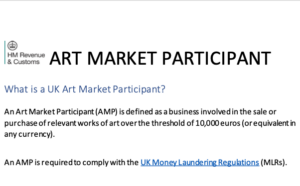Think that anti-money laundering that has hit the art sector doesn’t apply to your business, as you’re an overseas dealer presenting at a UK fair? Think again – including if you’re based in the European Union.
The downloadable guide provided in this post was created by HMRC (as the UK art market’s AML regulator) specifically so that a fair could communicate to overseas exhibitors:

The guide states the following:
Many dealers from outside the UK are unaware that they may need to register with HMRC for VAT and anti money laundering.
Dealers coming from outside the UK to a UK art fair, selling art over the AMP threshold of 10,000 euros (or equivalent in any currency) are subject to the same MLRs.
They must register with HMRC and comply with the regulatory requirements. This includes having a written risk assessment, written policies, controls and procedures, training and conducting customer due diligence to an appropriate level.
Overseas dealers under VAT rules will be considered as non-established-taxable-persons (NETPs). If they make any taxable supplies in the UK, regardless of the value the NETP must register for VAT and pay VAT on any sales done in the UK. To find guidance on NETPs go to GOV.UK and search ‘Who should register for VAT (VAT Notice 700/1)’.
The idea is that non-UK art businesses are able to register for AMP supervision after they’ve registered for – and been approved, for VAT. This will provide necessary reference numbers to use the gov.uk system.
However, what if you run your VAT through your shipper as a non-UK business?
Many non-UK art businesses have their shipper handle VAT as a ‘sub-party’ approved by HMRC. This enables the shipper to collect the VAT from the gallery’s clients and pay that to HMRC (regulator) as part of the quarterly VAT return. The challenge with this solution is that the art business does not receive a VAT number, and accordingly cannot register for Anti-Money Laundering Supervision with HMRC. We’re currently troubleshooting this scenario as a key stakeholder in AML for the art market, and recommend that in the meantime, you adhere to the ML Regulations’ requirements – see immediately below.
If your AMP registration is exceptionally delayed or you’re unable to register, it’s paramount that you adhere to the Money Laundering Regulations law itself, i.e.:
- undertake AML Training;
- have a risk assessment conducted of your business and a corresponding AML policy (with policies, controls and procedures) created outlining how those risks are mitigated;
- conduct Customer Due Diligence (“CDD”) for qualifying transactions;
- store associated records in a GDPR-compliant manner for five years; and
- submit any Suspicious Activity Reports if suspicious activity is suspected or detected.
Get in touch with our team if you need to expedite your AML Training, Risk Assessment / Policy and Customer Due Diligence solution. Having these solutions in place are required to have your AMP registration accepted.
Further reading:
>> Guide for registration as an Art Market Participant.
>> Register for or renew Money Laundering Supervision – and how to contact HMRC: for UK Art Market Participants
>> How do you conduct AML at an art fair?
>> AML Training: a legal requirement for AMPs
>> Risk Assessment & AML Policy: a legal requirement for AMPs
>> Is your (or another) art business registered for ML supervision?
This post was updated on 12th January 2023 to reflect that many art businesses run VAT via their shipper. If this is the case, it is not currently possible to register with HMRC.